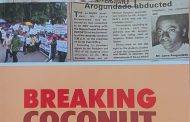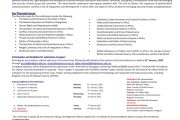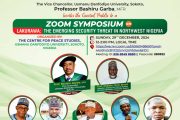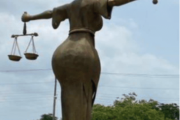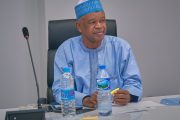The popular turn of phrase in Nigeria in this respect is ‘Ali Must Go’. It is the idiom summing up the demand for the removal of Col. Ahmadu Ali, (rtd), the then Minister for Education under whom students were shot dead by the police in the protests against hike in tuition fees in the university system in 1978. It is not much in use anymore but those who were involved have forgotten nothing about what it symbolizes: the real onset of the institutional philosophers of structural adjustment capitalism into Nigeria.
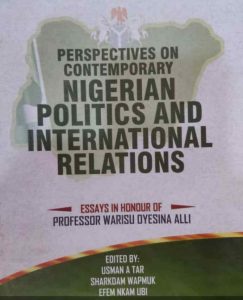 Well, here is a different Alli whose own trajectory supports a recasting of the resistance idiom into the very opposite of it: Alli Must Not Go’ or, if you like, ‘Alli Cannot Go’
Well, here is a different Alli whose own trajectory supports a recasting of the resistance idiom into the very opposite of it: Alli Must Not Go’ or, if you like, ‘Alli Cannot Go’
His mentees have conspired to organize a grand departure for him, made up of a book of essays in his honour and the assembling of a vast signifiers of the spaces of Political Science and International Relations disciplines in Nigeria to the farewell conference thereto.
In creating that assemblage, they have also created something beyond it: the materiality of the assemblage to bring about the International Relations, (IRs) moment in Nigeria. The sub-discipline is, like many others, far, far behind in terms of content. It is, in fact, outdated when situated in the directions the sub-discipline has travelled since the end of the Cold War. Majority of the universities are teaching a mid-1970 structure of IRs which reflected the level of development then. Today, that structure as found in the NUC B-Mass is simply no more than fragmentary takes from neorealism. Unfortunately, neorealism has not only been contested as a theory, it is in a very rapid decline as the Neopositivist meta-theory undergirding it.
 Unlike when that structure was developed, a pluralist schema is in vogue across the world except in a few countries such as Nigeria where this is not the case. Above all, there are completely new set of theoretical lenses in the study of IRs that one doesn’t hear about at all on Nigerian campuses. Poststructuralist IRs is one of them. This is why biopolitics, discourse theory, performativity, critical geopolitics, just to cite a few examples, are not part of the sub-discipline in over 90% of Nigerian campuses. If universities in most parts of the world are looking at things from these lenses but not a few others such as Nigeria, then there is a problem.
Unlike when that structure was developed, a pluralist schema is in vogue across the world except in a few countries such as Nigeria where this is not the case. Above all, there are completely new set of theoretical lenses in the study of IRs that one doesn’t hear about at all on Nigerian campuses. Poststructuralist IRs is one of them. This is why biopolitics, discourse theory, performativity, critical geopolitics, just to cite a few examples, are not part of the sub-discipline in over 90% of Nigerian campuses. If universities in most parts of the world are looking at things from these lenses but not a few others such as Nigeria, then there is a problem.
Who better than a Prof W. O Alli can be remobilized along with his retired but not tired colleagues to restructure IRs in Nigeria? Working with such institutions as the Nigerian Institute of International Affairs, (NIIA) which is just returning from a long hibernation to active think tanking or with a rising profile such as the Nigerian Defence Academy, (NDA), an Alli led coalition of senior/retired academics can certainly accomplish such a national security task. It is national security in the sense that the academic content of IRS in Nigeria today is a national security threat because it is incapable of framing the world or discursively locating Nigeria in it as to materialize the country the way it should in contemporary international politics. Yet, that is what the discipline is supposed to do.
 This is why this Alli cannot or must not go, just yet. That is, Alli in a symbolic sense. It doesn’t have to be Prof Alli per se. Prof Alli is a good signifier for that category. He did not just study IRS or Political Science, he encountered it outside the country, meaning a more diverse encounter. He did not just teach it, he was also there in the field of practice as a one-time Director of Research at the NIIA. More importantly, he represents a force field in the discipline. He cannot but belong to the generation that forced open the sub-discipline of IRs to the Marxist Theory of the field. Hitherto, the subject was closed to Marxism. Only Liberalism and Realism dominated except in the UK and Australia where a third approach exist(ed) called the International Society theory, aka the English School.
This is why this Alli cannot or must not go, just yet. That is, Alli in a symbolic sense. It doesn’t have to be Prof Alli per se. Prof Alli is a good signifier for that category. He did not just study IRS or Political Science, he encountered it outside the country, meaning a more diverse encounter. He did not just teach it, he was also there in the field of practice as a one-time Director of Research at the NIIA. More importantly, he represents a force field in the discipline. He cannot but belong to the generation that forced open the sub-discipline of IRs to the Marxist Theory of the field. Hitherto, the subject was closed to Marxism. Only Liberalism and Realism dominated except in the UK and Australia where a third approach exist(ed) called the International Society theory, aka the English School.
Nigerian scholars who studied in the UK in those days encountered only four dominant theoretical lenses: Liberalism, Realism, the English School and Marxism. Now, there are many more, from Constructivism/Securitisation; Poststructuralism/Critical Geopolitics; Feminism, Post colonialism and so on. Within each of these dominant theoretical frameworks, there are numerous middle-range theories and conceptual gunshots.
In the context of the knowledge – power nexus, these are not just academic speculations but the real politics itself because the slogan is no longer the idea of philosophers having interpreted the world leaving the point to changing it. The post-positivist idiom advances the rather different argument that interpreting the world is the same thing as changing it because interpretations are constitutive of reality. And this cannot but be true since Marx who pushed the distinction between interpretation and change produced all the changes traceable to him with interpretation rather than as head of any government, major institution or factories. His words are still configuring power relations and the consequences of such power relations many years after he has been gone.
So, reconstituting the course structure for IRs is an urgent matter in Nigeria. For that reason, all viable resource persons in that domain cannot go yet, even though they might have formally retired. If we were not running as a country under siege, identifying and re-assembling all such resource persons at one time or another is what the president or, at worst, his Minister for Education, would have been doing. In the absence of that, there is nothing wrong in seizing the high ground thereto with the assemblage stretching from the NIIA and the NDA to intellectual signifiers of Nigeria’s capital city university – the University of Abuja; the NPSA; the NOA; NIPSS, INEC and similar resource centres.
Can we see why, unlike the other Ali, this Alli should not go, just yet?





